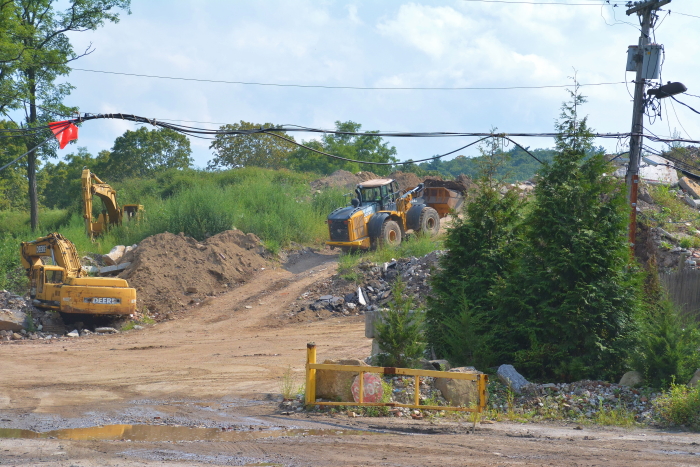State judge orders RNV to halt rock-crushing
The clash between Philipstown and a debris-processing operation on Route 9 escalated this month with dueling lawsuits: The town won an injunction in county court against any further rock-crushing, while the business, RNV Green Processing and Supply Corp., demanded the town pay at least $50 million in damages.
The legal arguments in Putnam County Supreme Court include allegations of spying by drones, a vendetta, dirty trucks, Zoning Board of Appeals (ZBA) missteps and violations of town law.
After the ZBA in January refused to override a stop-work order issued by the town building inspector in April to RNV, town officials requested a court order to stop further rock-crushing, along with any processing and stockpiling of demolition and construction debris, soil, dirt, gravel and vegetative material.

On Feb. 4, Justice Gina Capone granted the injunction but limited it to a ban on rock-crushing.
Ricky Ventura, who runs RNV, and his brother, Mark, inherited the 9.6-acre parcel at the corner of Lane Gate Road and Route 9 from their father, August Ventura. In 1979, their father opened a “construction yard” there that, according to the Ventura lawyer, provided rock-crushing.
Although the town lawsuit targets both brothers, the lawsuit against the town was filed by Ricky Ventura and RNV.
In its complaint, filed on Feb. 3, Philipstown charges that RNV continues to operate on the site, causing “noise pollution and the runoff of effluent onto roadways and adjoining properties.” It asked the court to stop the activity and to make RNV “immediately install erosion-control measures to mitigate impacts from the illegal construction activities [conducted] in violation of the town’s code” and “to restore the slopes, vegetation and wetlands” on the premises.
RNV’s lawsuit, filed on Feb. 10, asserts that Supervisor Richard Shea “improperly inserted himself” into the ZBA review and made “a blatant attempt to sway” it, and that an unidentified ZBA member later “admitted that the [Zoning] Board was expressly directed by the town supervisor to deny” the Ventura plea to remove the stop-work order.
The lawsuit also maintains that any noise or dirt on Lane Gate is probably from Highway Department trucks coming and going from Philipstown’s nearby recycling center and that “absolutely no runoff is coming from the [Ventura] property onto the roadway.” It also alleges that Shea has a “personal vendetta” against Ventura and reportedly spoke of “drones flying overhead and surveilling the property.”

In part, the conflict between the Ventura business and town involves evolving zoning law and the place — if any — of the Ventura enterprise under it.
Town records include approved applications for August Ventura but do not mention rock-crushing or debris-processing; nor did the law define what a “contractor’s yard” meant or what was permissible in one. At that point, the Ventura land fell into a now-defunct “industrial” zoning district.
For years Philipstown’s did not specifically address such matters. Then, in a 2005 zoning change, the Town Board forbade “the manufacture, processing or assembling of goods made from concrete or asphalt” as well as dirt, soil and gravel processing “and rock-crushing.”
In 2007, Tom Monroe, who was then the code enforcement officer and building inspector, accused the Venturas of violating the law. But two years later, Robert Emerick, who succeeded Monroe, stated that “all violations on file have been removed and the Building Department is satisfied with this property.”
Philipstown in 2011 enacted a zoning code that outlaws “processing of soil, dirt, gravel and rock, including rock-crushing” everywhere below the intersection of Route 9 and East Mountain Road South, an area that includes the Ventura property. But it also stipulated that “any use which existed lawfully” under old zoning but “fails to conform” to the 2011 update “may be continued, subject to the provisions and limitations specified” elsewhere under law. The revision threw the Ventura property into a “highway-commercial” zoning district.
Responding to anonymous complaints in 2013, Kevin Donohue, who had taken over as building inspector, determined that the Venturas were crushing rocks and engaging in similar disallowed activities and ordered them to cease.
Legal action followed and the brothers lost repeatedly, from the local justice court to the state appellate court, which ruled against them last March.
In April, the current building inspector, Greg Wunner, issued a stop-work order. The battle then shifted to the town ZBA, which, RNV said, had never considered its arguments. But at the ZBA on Jan. 13, Ricky Ventura again lost.
The Ventura’s attorney, Michael Sirignano, contends that RNV’s operations constitute a legal, pre-existing, non-conforming use — one that operated for years and was considered legal but now merely fails to fit under the present zoning code.
The Ventura lawsuit asks the Putnam Supreme Court to overturn the stop-work order and the ZBA decision; order the town to stop pursuing Ricky Ventura; and grant him damages “in an amount presently undetermined but believed to exceed $50 million, together with punitive damages” yet to be calculated.
